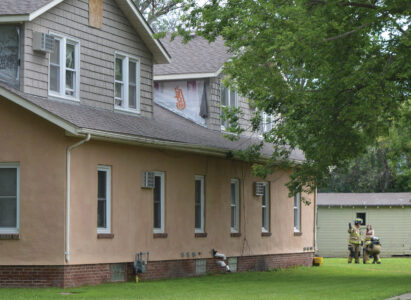Legislators hear about ‘cost’ of new laws
Swedzinski, Dahms hold series of town hall meetings

Photo by Deb Gau David Schelkoph, general manager of Marshall Municipal Utilities, voiced concerns about energy storage mandates during a town hall meeting with Sen. Gary Dahms and Rep. Chris Swedzinski on Thursday.
MARSHALL — Worker shortages and new laws affecting businesses were some of the main issues for area residents meeting with state legislators Thursday morning.
“This last legislative session was an absolute disaster for business,” said Tom Hey of Southwest Coaches in Marshall. “Do we ever think we’re going to be able to roll some of these things back that were out there, that have added cost onto businesses?”
The odds of repealing new laws like the Paid Family and Medical Leave bill were “pretty slim,” Sen. Gary Dahms said. “However, we are putting a lot of pressure on, especially on the paid family leave, that we get that back on the floor and get the details of that bill worked out.”
Making changes to new laws will pose a challenge while the DFL holds a majority in state government, said Rep. Chris Swedzinski.
“The only fruit that is going to be left on the tree, or something that Republicans could potentially pluck, are things that are truly driving people out of the state in a most egregious way,” Swedzinski said.
Swedzinski, R-Ghent, and Dahms, R-Redwood Falls, held a series of town hall meetings in the area Thursday, with stops in cities including Tracy, Marshall, Canby and Granite Falls. Swedzinski said the legislators wanted to hear concerns and questions from the public.
“Our goal really is look at a lot of the issues that are going to be facing businesses, a lot of the issues that are facing a lot of our small communities,” he said.
While the last legislative session did bring some positives for Minnesota cities, like increased Local Government Aid, Swedzinski said some of the good things would likely be negated by new regulations and costly government mandates. Dahms said the state also needed to stop “unsustainable” levels of spending.
A few different members of the public spoke up with concerns about worker shortages.
“The number one issue that I’m concerned about is workforce,” said Cliff Carmody, executive director of Southwest West Central Service Cooperative. Teaching licensure requirements in Minnesota were making it hard to hire educators, he said.
“You can be the teacher of the year and have 15 years of experience in South Dakota, and you may not ever get licensed to teach in Minnesota because of some of the requirements that we have. And we can no longer wait around for that to change,” Carmody said.
He asked how the public could help get legislators to make those changes.
Education wasn’t the only area short on workers. Hey said his business was short of its staffing goals by about 10 or 15%. Audience members also talked about the shortage of law enforcement officers in Minnesota.
“I don’t think there’s any industry that isn’t looking for employees. It’s widespread. We hear this all over,” Dahms said. “One of the things that can be done to help us to make sure that the majority understands the impact that a lot of the things they are doing are having on employers finding employees.”
Swedzinski said a lack of support for law enforcement in Minnesota was one component in the shortage of new officers, but it was a problem that legislators wouldn’t be able to fix on their own.
“We’re dealing with fundamental issues in the family,” he said.
Dahms said in the past two or three years, legislators did try to find ways to encourage people to go into the law enforcement field.
“We did put together a package and it included not only some bonuses to get new people in, it included bonuses for some of the older people to continue. There was also an advertising campaign, and I don’t know if that still is being funded today or not,” Dahms said.
“We do need to keep the message out there,” about the service law enforcement provides, he said.
Audience members also brought forward concerns related to Minnesota’s push for 100% renewable energy by 2040. Tim O’Leary, manager of Lyon-Lincoln Electric Cooperative, asked if legislators were considering reliability in the push for more renewable energy. He also asked if the state would consider modular or small modular nuclear reactors as an option to help meet its energy needs.
“Right now, the state of Minnesota has a nuclear ban,” Swedzinski said. However, he said, “It’s our goal that we would simply repeal that,” and consider a range of energy possibilities.
“It’s something we really need to be taking a look at, but it’s going to be hard to move the needle,” Dahms said.
David Schelkoph, general manager of Marshall Municipal Utilities, asked legislators to consider how energy storage mandates would affect small utilities.
“There’s an economy of scale when you apply that to storage facilities, either battery or some other way to store energy. The bigger it is, the less it costs per kW, and that means relief for the customers at the end of the line,” Schelkoph said. “My suggestion and my hope is that we’re able to give that information to the Legislature next year, and make them look at the power providers rather than the power distributors, because we cannot build a big enough storage device to bring economies of scale to bear.”
“I think you certainly bring up a good point,” Dahms said. “That’s something that we need to make sure that we get in front of the Energy Committee and that they’re aware of.”



